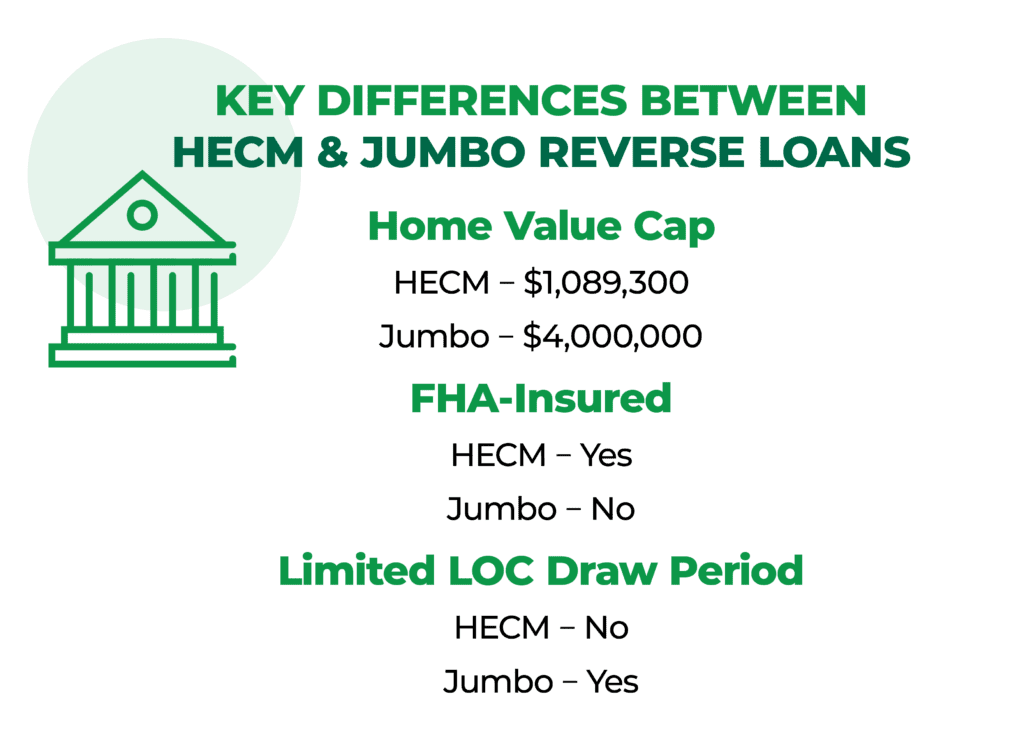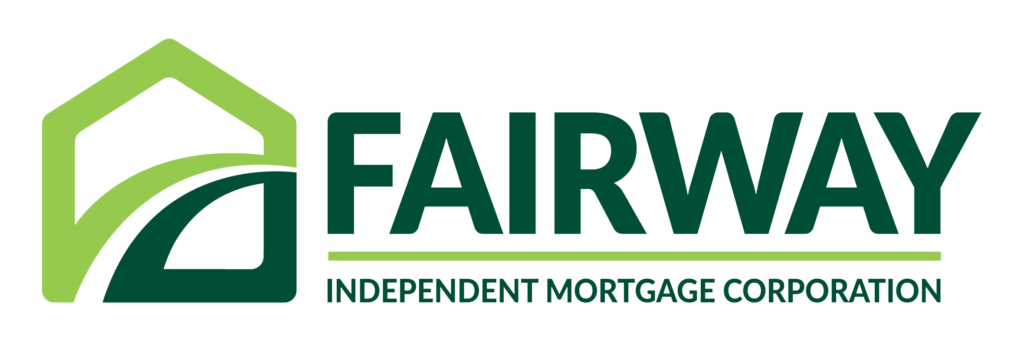Jumbo Reverse Mortgage Loans: What You Need to Know

For most older American homeowners, home equity represents a big, and mainly untapped, portion of their net wealth. Many of today’s retirees are finding that their retirement savings and Social Security are insufficient to maintain their standard of living and cover any contingencies that may arise, such as market volatility, soaring inflation and health issues.
Some turn to a reverse mortgage loan to enjoy a more comfortable and secure retirement without selling the home. Typical uses of a reverse mortgage are to supplement monthly cash flow, establish an emergency fund, refinance an existing mortgage and pay for in-home care or home renovations.

A reverse mortgage is a special loan for older homeowners requiring no monthly mortgage payments, though borrowers are still responsible for paying property charges, like property taxes and homeowners insurance.
While the Home Equity Conversion Mortgage (HECM) loan accounts for the vast majority of reverse mortgages in the U.S., it’s not the only type of reverse mortgage available. A jumbo reverse mortgage is an alternative option that may better serve a borrower who owns a high-value property.
What Is a Jumbo Reverse Mortgage?
A jumbo reverse mortgage is a private (investor-owned) reverse mortgage not involving the Federal Housing Administration (FHA) HECM program. The loan enables borrowers to access more equity in a high-value property (e.g., a seven-figure home) than they would otherwise get with a traditional HECM.
A jumbo reverse mortgage can also be used to buy a new, high-value home in lieu of a traditional jumbo mortgage to finance part of the home’s cost. As with most home purchase transactions involving a mortgage, the borrower must supply a down payment from their funds to supplement the financing.
A good way to think of it is that the down payment at closing establishes the required amount of home equity a borrower needs for a reverse mortgage because a prospective homebuyer wouldn’t have any equity in a home they don’t yet own.

With a jumbo reverse mortgage, whether for refinance or purchase, the borrower can defer repayment of the loan balance (not have to make any monthly principal and interest mortgage payments) so long as the loan terms are met. Interest does get tacked onto the unpaid loan balance, which can cause the loan balance to rise over time. The loan typically doesn’t become due and payable until the last surviving borrower permanently moves out of the home or passes away.
All reverse mortgages come with an important “non-recourse” consumer protection that ensures the borrower (or heirs) won’t be upside-down on the loan when the home is sold to repay the outstanding loan balance.
Jumbo Reverse Mortgage vs. HECM Reverse Mortgage
Several lenders offer jumbo reverse mortgages, and while many protections and features are similar to a traditional HECM reverse mortgage, there are some distinct differences.

Do I own the home and remain on title?
HECM: Yes.
Jumbo: Yes.
What is the borrower age requirement?
HECM: 62 or older.
Jumbo: Varies by product. Most require the borrower to be 62+ (some may allow for as young as 55+)
What is the home value cap used to calculate how much can be borrowed?
HECM: $1,149,825.
Jumbo: $4,000,000.
Are there required monthly principal and interest mortgage payments?
HECM: No.*
Jumbo: No.*
Can I make voluntary prepayments toward the loan balance at any time?
HECM: Yes.
Jumbo: Yes.
Does the Federal Housing Administration (FHA) insure the loan?
HECM: Yes.
Jumbo: No.
Are there required upfront and ongoing Mortgage Insurance Premiums (MIPs)?
HECM: Yes. The initial MIP is the lesser of 2% of the home value or 2% of the HECM limit (currently $1,149,825). The ongoing MIP is calculated at an annual rate of 0.5% of the unpaid loan balance. These costs can be rolled into the loan.
Jumbo: No.
What are some eligible property types?
HECM:
- Single-family residences
- Two- to four-unit properties
- Condos in HUD-approved condominium project
- Townhomes
Jumbo:
- Single-family residences
- Two- to four-unit properties
- Most condos, including ones that aren’t in a HUD-approved condominium project
- Townhomes
Is the draw period (the timeframe when funds can be drawn) on the line of credit limited to a set number of years?
HECM: No. You can draw available funds from the line of credit for the life of the loan.
Jumbo: Yes. The draw period is typically limited to the first 10 years.
Does the unused portion of the line of credit grow?
HECM: Yes. The unused portion of the line of credit grows at the same compounding rate as the loan balance for the life of the loan. In other words, you can achieve greater borrowing capacity over time by keeping some portion of the pledged funds in the credit line.
Jumbo: Maybe. Depends on the product. Credit line growth applied to unused funds is usually limited to a set number of years (e.g., the first 7 years).
Does the home have to be my primary residence?
HECM: Yes.
Jumbo: Maybe. Depends on the product.
Can I draw all of my loan proceeds right away?
HECM: Only if you are paying off sizable loan balances at closing. There are initial disbursement limits. Within the first 12 months of closing, the borrower is limited to the greater of 1) 60% of the principal limit or 2) mandatory obligations (things that must be paid off at closing, such as a first mortgage) + 10% of their principal limit. On an adjustable rate HECM, any remaining principal limit may be available to the borrower after the first 12 months.
Jumbo: Yes. Generally, you can draw the total amount without a waiting period.
Which tends to have a higher interest rate—a HECM or a Jumbo Reverse Mortgage?
HECM: The interest rate with a HECM tends to be lower than a jumbo reverse mortgage. However, with a HECM, the borrower is also charged upfront and ongoing mortgage insurance premiums.
Jumbo: See above. NOTE: The overall upfront costs tend to be lower with a jumbo reverse mortgage compared to a HECM.
What options do I have for receiving my loan proceeds?
HECM: You can choose from the following:
- A single-disbursement, lump-sum payout
- Line of credit to draw from as needed
- Fixed monthly advances (for a set number of months or the life of the loan)
- A combination of the above options
Jumbo: Depends on the product. Most include options for a single-disbursement, lump-sum payout or a line of credit with a limited draw period.
Does the mortgage need to be in the first lien position?
HECM: Yes. If the borrower still carries a traditional mortgage, it must be paid off at closing. The borrower can use some or all of the HECM loan proceeds to pay off the existing mortgage.
Jumbo: Maybe. Depends on the product.
Can the loan be used to purchase a new home?
HECM: Yes.
Jumbo: Yes.
Is it a non-recourse loan (borrower or heirs never owe more than the home is worth when sold**)?
HECM: Yes. The FHA insures the non-recourse feature on HECMs.
Jumbo: Yes.
Let’s Start a Conversation!
We want you to understand the pros and cons of a reverse mortgage to help you decide if one may be right for you (or a loved one). At Fairway, we offer a variety of mortgage products to meet the needs of older adult homeowners and homebuyers, including HECMs and jumbo reverse mortgages.
If you’re interested in learning more about reverse mortgages and whether one may be a good fit for you and your situation, Fairway can help. Get in touch with us today!
*Borrower must pay critical property charges, like taxes and insurance.
**There are some circumstances that will cause the loan to mature and the balance to become due and payable. Borrower is still responsible for paying property taxes and insurance and maintaining the home. Credit subject to age, property and some limited debt qualifications. Program rates, fees, terms and conditions are not available in all states and subject to change.
Copyright©2023 Fairway Independent Mortgage Corporation (“Fairway”) NMLS#2289. 4750 S. Biltmore Lane, Madison, WI 53718, 1-866-912-4800. All rights reserved. Fairway is not affiliated with any government agencies. These materials are not from HUD or FHA and were not approved by HUD or a government agency. Reverse mortgage borrowers are required to obtain an eligibility certificate by receiving counseling sessions with a HUD-approved agency. The youngest borrower must be at least 62 years old. Monthly reverse mortgage advances may affect eligibility for some other programs. This is not an offer to enter into an agreement. Not all customers will qualify. Information, rates and programs are subject to change without notice. All products are subject to credit and property approval. Other restrictions and limitations may apply. Equal Housing Opportunity.

